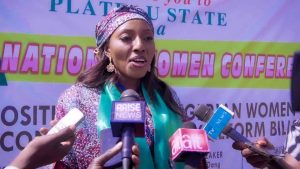Northern Women Advocate for Inclusive and Fair Tax Reform: Emphasis on Direct Engagement
By Xhyongo Sokoto, The Nigeria Times
Jos, Nigeria – The Coalition of Northern Groups (C.N.G.) has voiced constructive suggestions regarding the proposed tax reform bills under review by Nigeria’s National Assembly, highlighting the importance of inclusivity and direct consultations with marginalized groups, especially women in the North. During a press conference held at Odilin’s Event Center in Jos, Plateau State, on January 16, the team, led by Comrade Nankling Pamela Nanle, underscored the need for economic justice, transparency, and fairness in tax reforms to ensure they benefit women in the informal sector, a vital aspect of the northern economy.

Pamela recognized the efforts of the Presidential Tax Reform Committee, chaired by Mr. Taiwo Adeniyi, for fostering a dialogue-centered approach and stakeholder engagement. She also pointed out the existing “trust deficit” in the North, where many traders and farmers, predominantly women, are not fully informed about the potential impacts of the proposed reforms.
“The informal sector in the North, where women traders and farmers play pivotal roles, often faces marginalization and exploitation from intermediaries,” Pamela stated. “It is essential that the tax reform bill delineates benefits for this demographic to ensure economic justice and fairness. Engaging directly with these women is crucial in fostering trust and achieving equitable outcomes.”
Dr. Dogwom Dong, an economist and keynote speaker at the event, delved into significant issues surrounding the tax reform bills, particularly the Value Added Tax (VAT) provisions. He acknowledged the potential of the reforms to stimulate economic growth while emphasizing the importance of equitable revenue distribution across Nigeria’s diverse regions.
“The exemption of individuals earning below N800,000 annually from taxation is a commendable measure that will alleviate pressure on low-income earners,” Dr. Dong remarked. “Likewise, exempting companies earning N50 million or less from taxes is likely to encourage reinvestment, promote business growth, and create job opportunities, especially beneficial for many northern women who run small enterprises.”
While he recognized the positive impact of the reforms on economic efficiency, Dr. Dong noted that the current VAT-sharing formula may require reassessment. He advocated for adjustments to the revenue-sharing structure to motivate states to enhance economic activities while ensuring fairness.
“It’s essential to strike a balance between derivation, equality, and population-based revenue sharing,” he affirmed. “Promoting healthy competition among states is important, but we must ensure the reforms do not exacerbate inequality or create divisions among regions.”
Pamela Nanle reiterated the necessity of incorporating northern women into the tax reform dialogue. She urged the government to engage directly with market women and traders to ensure a comprehensive understanding of the reforms and their potential benefits.
“Northern women serve as the backbone of the informal economy, yet their perspectives are often left out of policymaking,” Pamela highlighted. “Our stance is not against the tax reform bills; rather, we advocate for provisions that support the underserved, particularly women. Their participation in consultations is essential for effective policy development.”
The C.N.G. concluded the press conference with an earnest appeal to the National Assembly, urging that the tax reforms prioritize inclusivity and fairness and reflect Nigeria’s diverse socio-economic landscape. The group reaffirmed that reforms should focus on the needs of the most vulnerable, including low-income earners and women in the informal sector.
“As conversations progress, northern women remain resolute in their pursuit of equitable and inclusive policies. Their message is clear: economic justice and empowerment must be prioritized in Nigeria’s tax reforms to foster a fairer future for all.” Said Pamela
